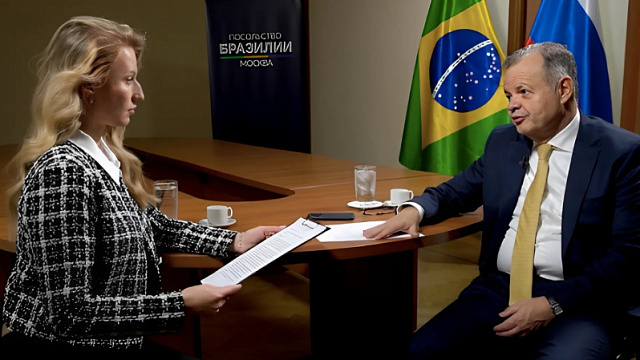
Rodrigo de Lima Baena Soares has been Ambassador Extraordinary and Plenipotentiary of the Federative Republic of Brazil to the Russian Federation since September 2021. He received a Bachelor’s degree in Law from the University Education Centre of the Federal District of Brasilia in 1986. In 1987, he completed the Diplomatic Service Training Course at the Rio Branco Institute. In the same year, he began his diplomatic career. He served at the Permanent Mission to the United Nations and Brazilian embassies in Paraguay, France, and Argentina. He served as Brazilian Ambassador to Mozambique and Peru. He has received various orders and awards.
Every year Moscow hosts the Festival of Latin American and Caribbean Culture. What role, in your opinion, does this festival play in the development of relations between Russia and Brazil and in strengthening international ties in general?
I believe that holding this festival is a success. Every year we actively participate in this event, attracting Brazilian musicians and artists. This project was launched by the Moscow Mayor’s Office and has been organised for several years. We believe that this festival is a great opportunity to tell Russians about our rich and diverse culture. We will definitely take part in this event next year.
A good example of cultural exchange is the “Russian Seasons” project in Brazil. What attracts the attention of Brazilians more: Russian ballet, theatre or music?
As you know, Russian culture is very diverse and rich. “Russian Seasons” introduces the Brazilian audience to the culture of this great country. I think we are most attracted to ballet and music. Ballet – for different reasons. For example, in Joinville, in the south of Brazil, we have the only foreign school of the Bolshoi Theatre. For more than 20 years it has already trained a large number of ballet dancers who perform in Russia on leading stages: in Kazan, Perm, Samara. Therefore, Russia is primarily associated with ballet and, of course, with the famous Bolshoi Theatre, as well as with music. Russia has many great composers and talented musicians. During my time here, I have attended many great concerts by young musicians.
Language plays a major role in cultural exchange. In your opinion, what work should be done to facilitate access to learning the national languages of the BRICS countries? And how soon should this be done?
Of course, we need to make quite a lot of efforts, because our languages are very different. I believe that these efforts are necessary, and we are making them. For example, in Russia, there are teachers, professors who teach the Brazilian version of Portuguese: at MGIMO in Moscow, and also in Kazan at Kazan University. We want to expand language education through cultural events dedicated to cinema, literature. Through culture, one can get to know the Portuguese language in its Brazilian version even better. We are working closely with Russian universities to study Portuguese in Moscow, St. Petersburg and other Russian cities.
Brazil and Russia share a history of long-standing cooperation in the field of education. Could you tell us what exactly this partnership is about?
Traditionally, we have supported interaction between Brazilian and Russian universities in various fields. In October 2024, we held one major event with representatives from more than 25 Brazilian universities, many of them at the rectorate level. Among the objectives were to establish contacts, interact with rectors representing Russian universities. We outlined 10 areas on the basis of which university cooperation is built. These were different areas, such as physics, chemistry, biology, artificial intelligence, and various fields of science. We concluded more than 40 agreements between the universities. And this is just the beginning of a great way of strengthening cooperation between our countries in the field of education.
Can Brazil’s experience in using renewable energy sources and working with them be useful for the BRICS countries?
Among the G20 countries, Brazil ranks first in terms of renewable energy sources, such as hydroelectric power plants, solar panels, biomass energy and much more. So we have a lot to offer, we are able to discuss it in a very flexible way, and of course it is an important topic, as evidenced by our active participation in all the world meetings, as well as the organisation of the 30th UN Climate Change Conference (UNFCCC COP 30) in 2025 in the Amazon in the city of Belem.
From your point of view, in which areas do the BRICS countries have the greatest potential to work together?
There are many such areas. We already have an important list of BRICS achievements, I would like to mention Russia’s successful chairmanship with the summit held in Kazan. I was in Ekaterinburg, where Russian representatives reported on their work within the framework of the association during 2024. Important meetings were held. In my opinion, cooperation in a number of areas could be further strengthened for the benefit of all BRICS countries, because the association includes 10 members and several partners. We are growing, expanding, dynamically developing. Therefore, we can benefit even more from a wider membership. The most important areas, in my opinion, are science, technology, innovation, education, environmental protection. In short, areas in which we have already advanced far but can go even further.
See the full version of the interview here.
Photo: TV BRICS


